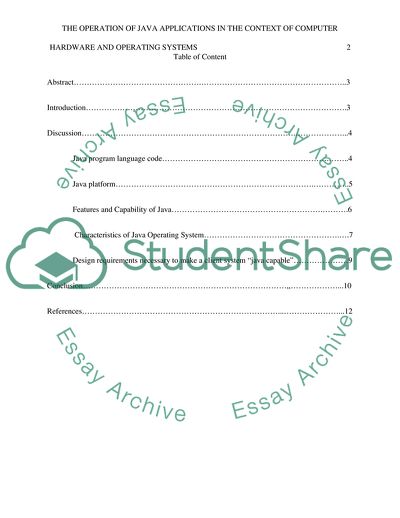Cite this document
(The Operation of Java Applications in the Context of Operating Systems Term Paper Example | Topics and Well Written Essays - 1500 words, n.d.)
The Operation of Java Applications in the Context of Operating Systems Term Paper Example | Topics and Well Written Essays - 1500 words. https://studentshare.org/information-technology/1813012-explain-the-operation-of-java-applications-in-the-context-of-your-understanding-of-computer-hardware-and-operating-systems-assume-that-you-are-beginning-with-java-programming-language-source-code-that-will-ultimately-reside-on-a-server-system-be-sure-to
The Operation of Java Applications in the Context of Operating Systems Term Paper Example | Topics and Well Written Essays - 1500 words. https://studentshare.org/information-technology/1813012-explain-the-operation-of-java-applications-in-the-context-of-your-understanding-of-computer-hardware-and-operating-systems-assume-that-you-are-beginning-with-java-programming-language-source-code-that-will-ultimately-reside-on-a-server-system-be-sure-to
(The Operation of Java Applications in the Context of Operating Systems Term Paper Example | Topics and Well Written Essays - 1500 Words)
The Operation of Java Applications in the Context of Operating Systems Term Paper Example | Topics and Well Written Essays - 1500 Words. https://studentshare.org/information-technology/1813012-explain-the-operation-of-java-applications-in-the-context-of-your-understanding-of-computer-hardware-and-operating-systems-assume-that-you-are-beginning-with-java-programming-language-source-code-that-will-ultimately-reside-on-a-server-system-be-sure-to.
The Operation of Java Applications in the Context of Operating Systems Term Paper Example | Topics and Well Written Essays - 1500 Words. https://studentshare.org/information-technology/1813012-explain-the-operation-of-java-applications-in-the-context-of-your-understanding-of-computer-hardware-and-operating-systems-assume-that-you-are-beginning-with-java-programming-language-source-code-that-will-ultimately-reside-on-a-server-system-be-sure-to.
“The Operation of Java Applications in the Context of Operating Systems Term Paper Example | Topics and Well Written Essays - 1500 Words”. https://studentshare.org/information-technology/1813012-explain-the-operation-of-java-applications-in-the-context-of-your-understanding-of-computer-hardware-and-operating-systems-assume-that-you-are-beginning-with-java-programming-language-source-code-that-will-ultimately-reside-on-a-server-system-be-sure-to.


